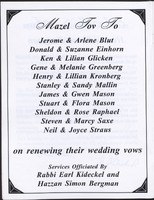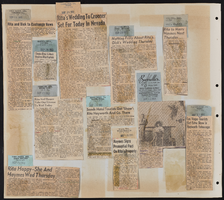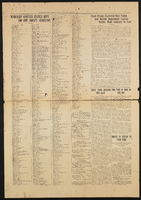Search the Special Collections and Archives Portal
Search Results

Transcript of interview with Richard Caldwell by Lloyd Henderson, March 06, 1980
Date
Archival Collection
Description
Text

Meeting minutes for Consolidated Student Senate, University of Nevada, Las Vegas, June 30, 2008
Date
Archival Collection
Description
Text

Meeting minutes for Consolidated Student Senate, University of Nevada, Las Vegas, September 25, 2006
Date
Archival Collection
Description
Text

Program for The Wedding event at Temple Beth Sholom, June 11, 1995
Date
Archival Collection
Description
Booklet for the Wedding celebrations and vow renewals of couples at Temple Beth Sholom.
Text

Transcript of interview with Renee Marchant Rampton by Dr. Caryll Batt Dziedziak, September 25, 2015
Date
Archival Collection
Description
Renee Marchant Rampton has often referred to herself as "One of Fifteen." Indeed, growing up in a family of fifteen children, Renee experienced the care of loving parents, the excitement of a bustling household, and the engagement of an active Church; all amidst the strains of a depression era economy. Renee's mother, Beatrice Marchant, provided Renee with a strong role model with which to emulate; a disciplined woman, who rose to the task without hesitation. Beatrice became the family's provider after her husband's debilitating stroke and later served in the Utah Legislature during the 1970s. Renee loved music from an early age. As a young child she found an early job as a piano accompanist for a dance studio. In 1956 she married musician, Roger Rampton, a successful percussionist. They soon settled in Las Vegas, where Roger performed on the Strip and they began raising their four children. It was an exciting period in Las Vegas history as the Strip attracted musicians and
Text

Transcript of interview with Sydney Wickliffe by Claytee White, February 1, 2013
Date
Archival Collection
Description
Sydney Wickliffe, nee Botkin, was born in Long Beach, California in 1944. Her parents, Donald and Betty Botkin, moved their young family first to Denver and then to the small town of Ulysses, Kansas before heading for Las Vegas in 1952, when Sydney was eight years old. Since then, she has called Las Vegas her home, graduating from Rancho High School's inaugural senior class in 1962. Growing up in a growing city, Sydney combined an active youth with long hours working in her father's North Las Vegas pharmacy and, later, would earn her degree in accounting from UNLV. As a CPA, she worked as an auditor for the Gaming Control Board and, in 1987, was promoted to deputy chief. From there, she took on the challenging role of director in Nevada's Department of Business and Industry as a member of Governor Kenny Guinn cabinet. As she says, even "one of the north-town girls" can go a long way - and in this interview, she shares memories that help us all see what the Las Vegas she remembers was like in the 1950s and 60s and how it helped to shape the person she is today.
Text

Transcript of interview with Bruce L. Woodbury by Stefani Evans, September 27, 2016
Date
Archival Collection
Description
As Bruce Woodbury reflects on his twenty-eight years as Clark County's longest-serving County commissioner (1981–2009) he recalls serving with about thirty different commissioners. Surprisingly, "only seven of us got major jail sentences." He ruminates how Federal Bureau of Investigation probes Operation Yobo in the early 1980s and G Sting in the early 2000s exposed several Clark County politicians who succumbed to greed. While Woodbury considers honesty in office a given, his values were not held by all of his colleagues. One Operation Yobo recording caught a fellow commissioner responding to the query, "How about Woodbury?" with, "No, you can't touch him with a ten foot pole." Woodbury remembers his "campaign guys really liked that." Apparently the voters did as well, as he consistently won re-election. The Las Vegas native, who was raised in the John S. Park neighborhood and attended Las Vegas schools, earned his Bachelor's degree at the University of Utah and his Juris Doctorat
Text



